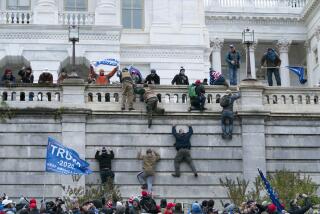Democracy in Russia
- Share via
* Referring to the editorial, “What Is Yeltsin Up To?” (Oct. 6), I would like to make a few comments. (I am a Russian businessman studying American business techniques under the program initiated by the U.S. Department of Commerce.) The editorial definitely shows a lack of understanding of what is going on in Russia.
The true facts are (and some of them have been mentioned): Boris Yeltsin finally moved against the die-hard Communists in the Parliament (obstructing reforms in all ways possible); banned a number of nationalist and chauvinist publications, which openly called for the overthrow of the president and his government and for restoration of the Soviet Union; and put pressure on the Constitutional Court which, instead of being impartial, always sided with the Parliament.
I find the tone of the article unjustifiably alarmist. It took Yeltsin two years to make the decision to put an end to this stalemate. He did this reluctantly and only when there were no other possibilities. And who started shooting? Parliament supporters.
It is impossible to move from dictatorship to democracy in one day. The two-year stalemate almost brought Russia to the brink of civil strife. With few democratic institutions in place, a degree of autocracy is unfortunately necessary. Of course, unless one wants to see instead of Russia several dozens of squabbling republics, another Yugoslavia or, God forbid, die-hards back in power.
NIKOLAI DEVYATKIN
Ontario
* In “Uncertain Road to Democracy: Can Yeltsin Get There From Here?” (Oct. 7), I was happy to read that the Russians are trying desperately to start a real democratic procedure. The more I read, though, the more it sounded hypocritical to me. After the fiasco at the Russian White House, Yeltsin has promised that only “all politicians, parties, and movements that have not stained themselves with direct involvement” would be able to compete in the “equal opportunity” elections. Am I mistaken, or does democracy not mean a form of government in which the power is given to the people or to their elected representatives under a free electoral system?
Although Yeltsin’s promise was unclear about who was actually banned from the elections, it was made certain that Communists would not be able to run. This might be good for a country that is trying to turn to democracy, but I feel that if during the elections, Russians feel that they want to elect Communists, they should be able to. Now that Communists are banned from the elections, the only other choice that is strong enough to win is the Yeltsin government. All in all, I believe that if Russia feels it wants to start toward the road of democracy, it must take the first step and institute a fair system of elections; otherwise all of democracy is lost.
MAUREEN LEVINKRON
West Hills
* In the wake of Yeltsin’s military crackdown on democracy and the continuing forced march to the market, only one question remains: Who’s the hard-liner now?
RON LEIGHTON
Fountain Valley
* Though Alexander Cockburn and Patrick Buchanan approached the subject somewhat differently (Columns Left and Right, Oct. 5), they had total agreement, an amazing feat in itself, on one point: Yeltsin is a dictator. Considering the extra-constitutional (read illegal) measures Yeltsin continues to take to eliminate his political opposition, such as press closures, censorship, ban on political meetings, etc., it is even more amazing to see how everyone (including our own democracy-loving government and free press) continues to see this man as the only hope for democracy in Russia.
Who are we trying to kid?
A. JAN
Santa Monica
More to Read
Sign up for Essential California
The most important California stories and recommendations in your inbox every morning.
You may occasionally receive promotional content from the Los Angeles Times.












